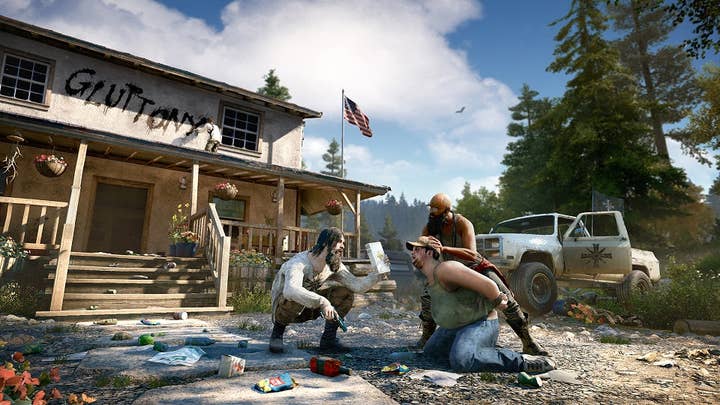Ubisoft says avoiding messages is part of making "more mature games"
VP of editorial Tommy Francois talks about publisher's stance on politics in games, says "Nothing is simple in life"
Ubisoft has taken heat a number of times for its public insistence on making games without political messages.
Whether it be with Far Cry 5's depiction of a heavily armed religious cult in rural America, The Division's post-apocalyptic America where civilian militias shoot looters with impunity, or going back to Assassin's Creed's original setting during the Crusades, the publisher has made a habit of taking provocative, compelling subject matter and building open-world games around them that do their best to avoid taking a side or having a message.
While Ubisoft representatives have discussed the subject a number of times, the company today published its own Q&A with VP of editorial Tommy Francois, indicating that this approach was set by the company's CEO Yves Guillemot.
"Yves has told us that our goal is to give players all the information we can, and then let them choose which sides of our game worlds they want to explore," Francois said. "We want them to decide what they like, what they don't like, and if and how to change their minds or the way they play based on that information. It's about more freedom for the players."
Francois said that "games should offer a 360-degree view of life" and "let people interact with all points of view." So if he were to set a game during the Vietnam war, he would want it to reflect everyone's point of view.
"And that relates back to people making up their own opinions and our ability to create more mature games that are nuanced, versus being black or white."

When asked if there are any lines the company won't cross, any points of view that aren't worth exploring, Francois says generally no.
"As we are building the game, in most instances, there tends to be self-censorship that we actually fight," Francois said. "My boss, Serge Hascoet, the CCO [Chief Creative Officer] for Ubisoft, has often told teams, 'I have never had to censor you guys. You censor yourselves. Please push me and make us consider whether we should censor you, because it would be proof that you're saying things. And I'd rather have this problem.'"
"Instead of being scared, know your enemy, or learn more about something that you think you don't like"
Tommy Francois
He added, "We believe that ultimately, in the future, players should be able to go in the game world, have as many different experiences as they want, experience as many different political views as they want, as many religions as they want ... as many different fantasies as they want."
He acknowledged that this approach could be causing people to sympathize with "things we know aren't necessarily the best things about society and the real world," but didn't see that as a reason to not do it.
"Instead of being scared, know your enemy, or learn more about something that you think you don't like," Francois said. "I think that video games can help with that. They can talk to things in real life. They can make us better people."
Francois acknowledged that Ubisoft developers tone down depictions when they feel they are being "too stereotypical or disrespectful," but also expressed regret for that.
"It makes me sad, actually, when I see some of the stuff that has been cut," he said. "We cut for production issues, obviously, because we have great ambitions, but also need to finish games. But there also are other reasons for cutting. Sometimes, the team doesn't feel comfortable with how something is being portrayed."
To illustrate his thinking, Francois brought up a story of an elephant that enters a village where a number of blind men are.
"They all touch the elephant," he said. "One touches the leg and thinks it's a tree trunk. Another one touches the elephant's trunk and thinks it's a snake. The other one touches one of the elephant's tusks, and thinks it's a spear. They all think they're right. And they're fighting over it, deeply. But some dude walks in the village and tells them, 'You're all right. None of you have the larger picture.' I think videogames can give people the larger picture. I think we need to bring a larger perspective on this.
"We need to be about problem solving. We need to be about taking a step back, and making people understand that nothing is simple in life."
